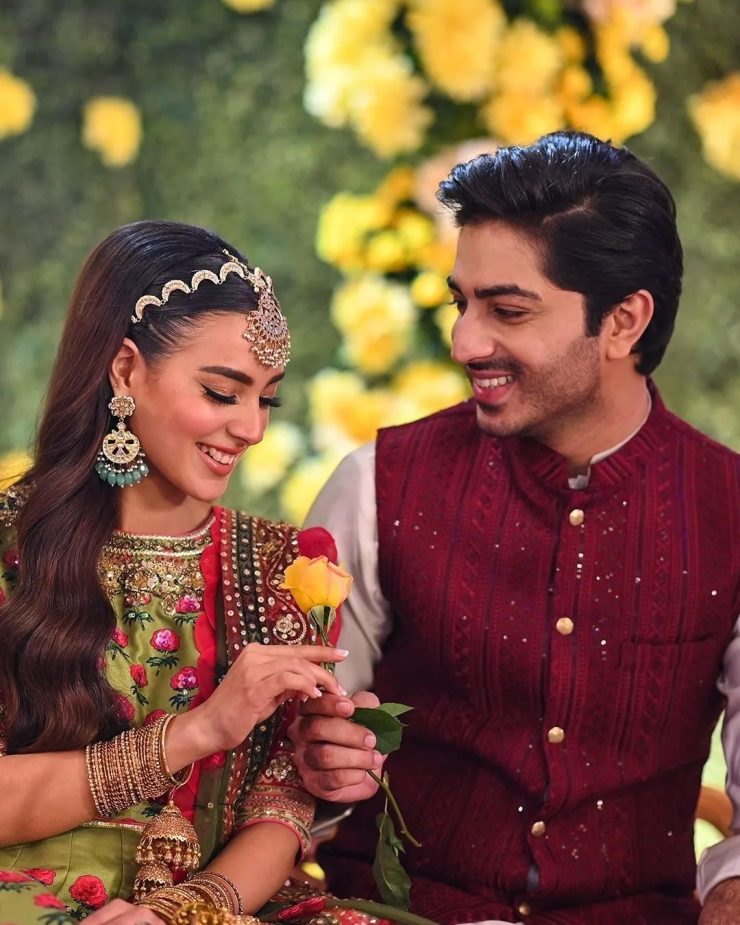Mannat Murad packages harsh realities in shiny candy foil
– GLOSS ETC

The people who may have seen Mannat Murad’s initial teasers and assumed it to be an easy breezy young romance probably have second thoughts now. The drama, helmed by Abdullah Kadwani and Asad Qureshi of 7th Sky Entertainment, may have romantic elements within it but the lighthearted scenes have quickly progressed to many more tragic ones.
Packaged within Mannat Murad’s colorful, glossy, star-studded narrative are some harsh realities.
Talha Chahour and Iqra Aziz are Murad and Mannat respectively and accompanying them is a talented ensemble cast headlined by Irsa Ghazal and Noor ul Hassan. Both Murad and Mannat are in love but his over-possessive mother and her very protective older brother would never agree to a love marriage. And so, the two of them cook up a scheme and contrive to portray their marriage as one that has been ‘arranged’ by their elders.
Their life after marriage lays open the cracks that run deep within Pakistani society. There are multiple scenes that drive home the issues that young couples tend to face, forced to cope with norms such as an intrusive joint family system, overbearing in-laws and an entire family depending on the son or the brother to be their support. Murad tells Mannat that despite the fact that they are now married, they have to pretend to not like each other and they can’t converse easily with each other or go out alone while under the scrutiny of his mother and four sisters.
Despite these efforts, there are scenes where Murad’s mother – Irsa Ghazal in a brilliant performance – gazes at him desolately, as if she has lost her most prized possession, her son. There are times when Murad’s family – Rehman Zaman, Sana Nadir, Mizna Waqas and Faiza Gillani pack in the punches as Murad’s sisters – frowns at each other as soon as they see the couple sharing even the slightest moment of affection. On their wedding night, Murad’s mother has him stay up till late with her, pressing her legs. It is all very frustrating and while Mannat and Murad may present an extreme case scenario it also all, unfortunately, rings true.

In these rather dire circumstances, it is heartening to note that Mannat, at least, is not your usual long-suffering daughter-in-law seen in TV dramas. Forthright and independent, she is inclined to privately roll her eyes at her in-laws and retire into her room. She has lengthy discussions with the spineless Murad, asserting her rights as his wife and how they no longer have to lie about their relationship. She may love him and may want them to live happily together but she is also firm in her beliefs.
Sadly, Murad’s mother and sisters are Mannat’s equals when it comes to being stubborn and putting up a fight. It seems that the drama’s story will primarily focus on this clash of egos rather than romance. These scenes are expected to be powerful ones given that a prestigious lineup of actors will be acting them out.

At one point, in a recent episode, Murad’s mother threatens that she will kill herself if he doesn’t divorce Mannat. Never one to argue with his mother but pained by her demand, he is shown perplexed and desolate, eventually putting a gun to his head. While showing suicide can be triggering for many, the extreme route adopted by Murad show just how helpless he feels. One wishes that he had more courage but at the same time, Talha Chahour expertly emulates men who end up getting torn between their mothers and their wives – again, a sad reality within Pakistani society.
It’s a hard-hitting story, wrapped up in shiny candy foil. The production standards are high-end, characteristic of 7th Sky Entertainment, with even small details such as wardrobe and interiors planned out to the tee. Director Wajahat Hussain moves the story along smoothly and the cast is very talented, with Talha Chahour and Iqra Aziz making a sweet new on-screen pair. Having said this, had it not been for the efforts made to uplift the script, Mannat Murad could have gotten reduced to the usual weepy story about cruel in-laws.
At the same time, the initial premise of the story leaves one asking questions. Why did Murad and Mannat agree to marry in the first place when both were aware of their very disparate family backgrounds? And even if the young couple was blinded by love, why did Mannat’s family in particular – progressive, educated, the brothers doting on their only sister – agree to the marriage especially when Murad’s mother openly made demands regarding dowry and haq-meher?
Mannat Murad may be accurately representing the issues faced by young married couples but the earlier episodes preceding the couple’s marriage do leave some questions unanswered. The strength of the narrative lies in how the drama will now unfold.
How will the couple resolve the issues, created solely because of the intrusion of their families? It seems that there are lessons to be learnt in later episodes.
